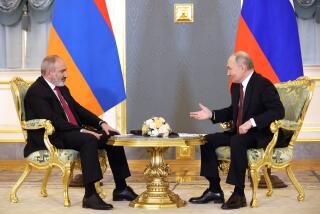U.S., Russia See Thaw in Relations After Kosovo Chill
- Share via
WASHINGTON — Vice President Al Gore and Russian Prime Minister Sergei V. Stepashin agreed Tuesday to put aside differences over the Kosovo war and move ahead on arms control, economics and other staples of the Washington-Moscow relationship.
Gore said the two countries put their relationship “back on track,” and Stepashin agreed that, “after some cooling” caused by disagreements over the North Atlantic Treaty Organization’s bombing of Yugoslavia, the United States and Russia are again ready for a businesslike partnership.
The leaders decided that arms control experts from both governments will meet in Moscow next month to begin talks about additional deep cuts in their arsenals of offensive nuclear weapons. Also on the agenda will be Washington’s call for revisions in the 1972 Anti-Ballistic Missile Treaty to allow construction of defensive shields against the emerging missile threats posed by North Korea, Iran and other rogue states.
Gore and Stepashin also discussed Russia’s economic reform agenda, commercial space cooperation and Moscow’s call for food assistance to Serbia, a step that Gore said Washington can live with as long as the aid is entirely humanitarian and does not help Yugoslav President Slobodan Milosevic rebuild his economy.
Stepashin’s visit was part of a system of consultations between Gore and the Russian premier that has been in place for six years. The last scheduled session was aborted in March when then-Prime Minister Yevgeny M. Primakov turned his plane around over the Atlantic and returned to Moscow to protest the start of the NATO bombing campaign. Stepashin joked that he took no chance of a similar mid-Atlantic turnabout by traveling to the United States by way of the Russian Far East and the Pacific, arriving first in Seattle.
Next month’s arms control talks are intended to resolve sharp differences over Washington’s proposal to overhaul the ABM treaty and to start on a third strategic arms reduction treaty, START III. However, Gore said the arms reduction pact cannot be finished until the Russian parliament ratifies START II, which has been stalled there since 1993.
Russia is very distrustful of Washington’s ABM plans, arguing that the treaty has helped maintain the strategic balance for a generation and should not be tampered with. U.S. officials argue that the proposed system, designed to thwart an attack of a few missiles from terrorist groups or rogue states, would not be capable of turning back a saturation attack from Russia, thus maintaining the countries’ strategic balance.
At a news conference with Gore, Stepashin offered the most optimistic assessment yet from any Russian official. He said Russia also faces dangers from rogue states and acknowledged that the planned U.S. system is not directed against Russia.
Gore and Stepashin gingerly acknowledged that the two governments continue to spy on each other almost a decade after the end of the Cold War.
In response to a question from a Russian reporter about U.S. press accounts of Russian espionage, Stepashin--formerly head of Russia’s counterintelligence service--said: “There is a problem such as that. It exists somewhat artificially now. I can say this because I worked in a certain agency, you know. . . . As long as states exist, there will always be special services.”
Gore agreed: “We’re not in a cold war anymore. We are cooperating. . . . Of course, old attitudes in both countries fade away slowly. But sometimes [spy] agencies want to use old attitudes as an excuse for old budgets and old personnel rosters.”
Wide gaps remained between the United States and Russia in their approach to postwar reconstruction in the Balkans. During an earlier lunch with reporters, Stepashin said that something must be done to feed the 10 million residents of Serbia this winter.
He said Russia is ready to sell food to Yugoslavia on easy credit terms. Gore repeated the U.S. and NATO position that no economic aid can go to Milosevic’s regime. But he said Washington will not try to block humanitarian aid.
More to Read
Sign up for Essential California
The most important California stories and recommendations in your inbox every morning.
You may occasionally receive promotional content from the Los Angeles Times.










